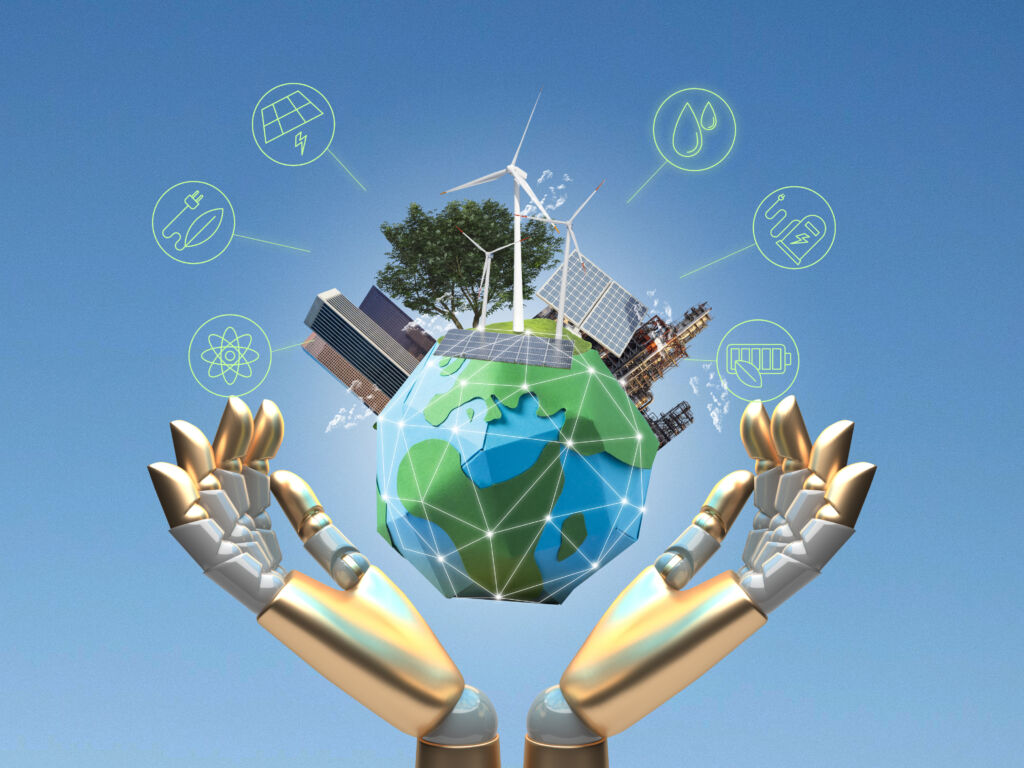
At this time of incredible technological innovations, we also face the daunting reality of environmental degradation. Tech innovations can either be developed and deployed in a responsible manner, or they can ride roughshod over environmental concerns. We believe Virtual Reality (VR) holds the potential to be a force for sustainability and environmental protection.
In this blog we will explore firstly how sustainability is being tackled by the hardware manufacturers. Secondly we examine the environmental consequences of VR implementation for businesses. Finally, we look towards the future and how VR might function in a coexisting world of technology and ecology.
Eco-friendly Innovations in VR
Manufacturers are aligning production practices of VR headsets with sustainability, crafting devices that are energy-efficient and environmentally considerate. The initial generations of VR headsets were notorious for their energy consumption. However, advancements have paved the way for models that not only consume less power but also contribute positively to broader environmental conservation efforts. Each new generation of headsets is making strides in this regard.
Mersus Technologies and Sustainability in VR
At Mersus Technologies, we’re embedding sustainability in the core of our VR developments. We leverage VR’s potential to not only transform user experiences but to do so in an environmentally responsible manner.
How VR Training Aligns with Sustainable Development Goals
VR training plays a pivotal role in advancing corporate sustainability and helps companies make significant strides towards achieving their Sustainable Development Goals (SDGs). It provides an innovative approach that aligns business practices with environmental conservation and responsible resource usage, marking a transformation in traditional training methods.
Minimising Greenhouse Gas Emissions
VR training eliminates the imperative for physical presence, which dramatically decreases the necessity for travel. By reducing the reliance on conventional modes of transport, businesses can substantially lower their carbon emissions, directly contributing to the global effort to mitigate climate change.
Optimising Resource Consumption
Traditional training methods often require extensive resources, including paper, energy, and physical space. VR training mitigates the need for such resources, optimising consumption and minimising waste, thereby promoting resource efficiency and conservation. This not only results in cost savings but also aids in reducing the environmental impact of training processes.
Embracing Sustainability through Avatar Academy
Our Avatar Academy platform exemplifies our commitment to sustainability. It is meticulously designed to provide companies with a unified platform for all their VR training needs, ensuring continuity and adaptability amidst the evolving landscape of VR headsets and hardware. By centralising VR training, we not only streamline the learning process but also contribute to reducing the ecological footprint of organisations, minimising the need for multiple platforms and the subsequent energy consumption and waste associated with them.

Looking to the Future of Sustainability in VR
As VR training becomes standard across various industries, we could witness a monumental shift in environmental conservation efforts. The universal adoption of VR training methodologies would signify a colossal reduction in the need for physical resources. It would essentially eradicate the necessity for physical training materials and substantial training setups, conserving natural resources and reducing industrial waste.
The abandonment of travel related to training would result in a significant reduction in carbon emissions, contributing to the alleviation of our current climate crisis. By eliminating the need for participants and trainers to travel, VR training could play a role in reducing the global carbon footprint, thus aiding in the combat against global warming and environmental degradation.
Moreover, the ability of VR to replicate intricate machinery and processes would allow industries to optimise resource allocation efficiently. Industries can simulate expensive and resource-intensive processes, fostering an environment where learning and development are no longer constrained by financial or material limitations.
This transition would not just lead to considerable cost savings for industries but also to a significant reduction in energy consumption. The ability to simulate real-world scenarios and environments without the associated resource and energy expenditure has the potential to create a ripple effect, promoting sustainability across multiple sectors of the economy.
In such a future, the synergy between VR training and sustainable practices could drive a new era of industrial operation, where ecological responsibility is inherent, and sustainable development is integrated seamlessly into the corporate ethos.
We invite you to reflect on how the sustainable VR solutions provided by Mersus Technologies could align with your organisation’s environmental goals. Could our VR solutions be the key to unlocking your company’s sustainable future, aiding you in achieving your ecological objectives while optimising operational processes?